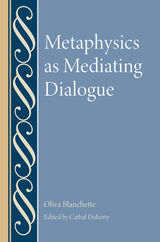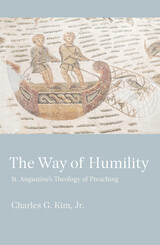2 books by Doherty, Cathal

Metaphysics as Mediating Dialogue
Olivia Blanchette
Catholic University of America Press, 2023
Metaphysics is not often spoken of as a venue for dialogue about anything, let alone culture or religion, which are more readily associated with phenomenology or hermeneutics in contemporary thinking. This collection of essays, however, by the late Boston College philosopher Oliva Blanchette, maintains the absolute necessity of metaphysics as a prerequisite for examining any particular ‘realm of being,’ in all areas of human inquiry, from the particular sciences to historical cultures and religions. Blanchette proposes metaphysics as a fundamental and necessary level of intelligence presupposed in any exercise of judgment, discourse, or dialogue, among rational beings. At the same time, he defends the idea that dialogue is the first and most fundamental form in which such reasoning takes place in human experience, on a radically intersubjective level through language.
Metaphysics is not an abstraction removed from human experience. Rather, it is a science in its own right defining itself in relation to ‘being as being’, its subject matter, as it depends on all the particular sciences and bodies of knowledge. Firmly standing on the ground of human experience, and on the human person as primary analogate of being, it opens up an entire realm of questioning that the particular sciences and bodies of knowledge, operating in functional separation, cannot pose on their own, especially when they take, in a reductionist fashion, their own object to be the prime analogate.
Metaphysics, in fact, insinuates itself into each and every particular science in exploring its own subject matter of ‘being as being’ in the analogical sense, advancing to more and more complex stages of analogy through dialogue among different spirits and cultures, and reaching its terminus in the transcendent aspect of spirit and religion. In this sense, metaphysics has much to say to theologians: without metaphysics, theology reduces to mere superstition.
[more]

The Way of Humility
St. Augustine's Theology of Preaching
Charles J. Kim
Catholic University of America Press, 2023
For Augustine, that the Word became flesh transformed a merely human understanding of the virtues and grounds all virtue in humility. The Way of Humility: Augustine’s Theology of Preaching explores how this truth became a new paradigm for understanding the scriptures and thus, how Augustine embodied the virtue in the preaching of the scriptures. One of Augustine’s most devoted students, Possidius, said that anyone can learn from reading Augustine, but “those were able to profit still more who could hear him speak in church and see him with their own eyes. Truly, he was indeed one of those of whom it is written, ‘speak this way and act the same way.’” The Way of Humility searches for evidence of the virtue of humility in action through the preaching of the humble Word in the sermons of Augustine.
Many know of Augustine through his more famous treatises but few have encountered the Doctor of Grace where he had his most immediate impact, preaching. The Way of Humility follows the sermons through several traditional theological loci, ecclesiology, Christology, soteriology to uncover what can be learned about Augustine’s theology through the way he preached to a mixed audience of urbanites and rustics, many of whom did not have the benefit of a formal education. Throughout the book, we see the interplay between Augustine’s action in speech and Augustine’s more direct statements on his theology of Preaching. Through handing over Christ in his sermons, he became himself an example of humility for the congregation on their journey toward the final end for all people, the Beatific Vision.
[more]
READERS
Browse our collection.
PUBLISHERS
See BiblioVault's publisher services.
STUDENT SERVICES
Files for college accessibility offices.
UChicago Accessibility Resources
home | accessibility | search | about | contact us
BiblioVault ® 2001 - 2024
The University of Chicago Press









